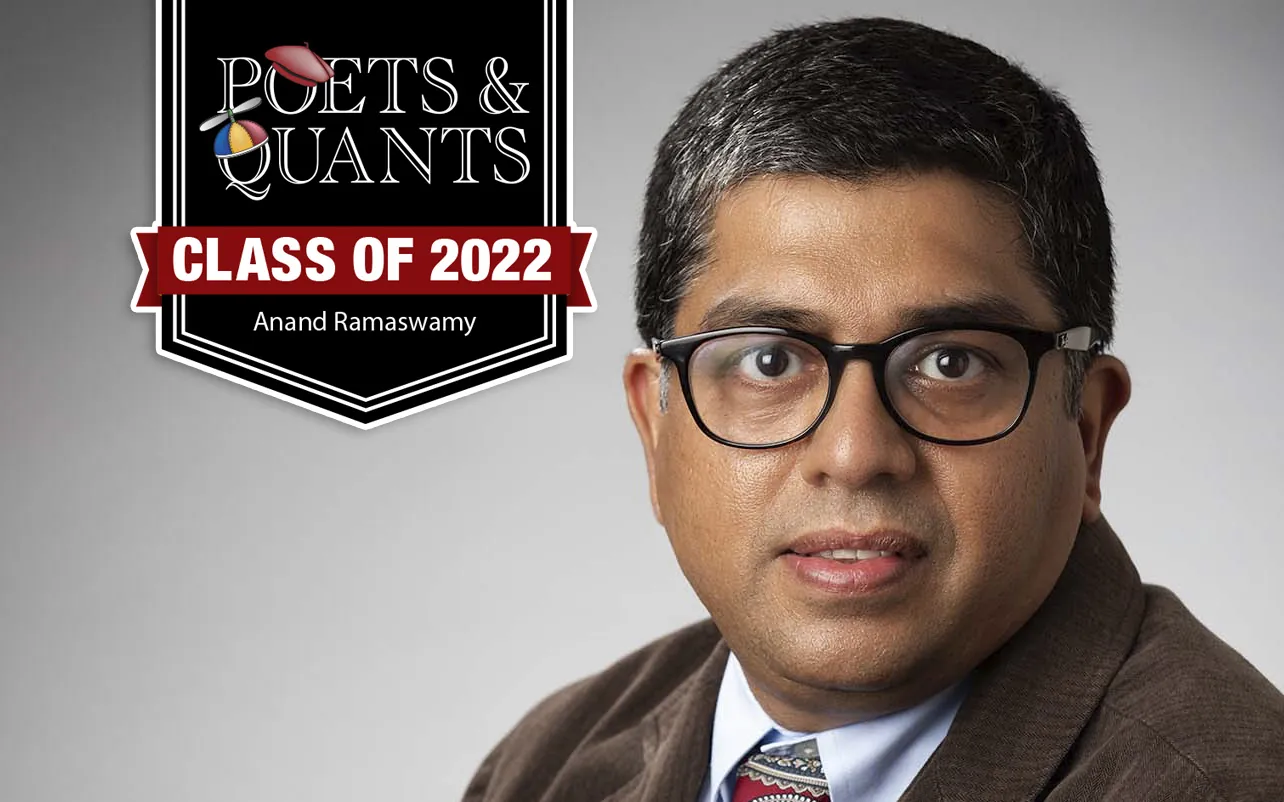
Student Name: Anand Ramaswamy
Describe Yourself In 15 Words: I am a passionate individual who thrives in challenging environments by being diligent, dutiful, and futuristic.
Hometown: New York City.
Fun Fact About Yourself: If I could get a lifetime supply of POHA (Indian flattened rice) I would eat it for breakfast every day.
Undergraduate School and Major: Coimbatore Institute of Technology (Bharathiar University), Coimbatore INDIA Computer Technology.
Current Employer and Job Title: Senior Director – Digital Transformation at Hospital for Special Surgery, New York.
Describe your biggest accomplishment in your career so far: I was a key contributor in designing a web-based citizen relationship management system (311) for cities and counties. This system included providing call center solutions, workflow management, asset utilization, dashboards, and a citizen portal for service requests.
I was also an instrumental contributor in developing a pharmacogenomics program leveraging a clinical decision support tool, establishing a framework for use, evaluating genomic information in clinical care, and pairing with electronic health record systems.
At the onset of the COVID-19 pandemic, I played a critical role in scaling and implementing technology platforms by rapid deployment of telehealth solutions, scaling the existing clinical system, and collaborating with various stakeholders from health systems, such as clinicians, and city and state governmental agencies.
Describe your biggest accomplishment as a graduate student: My work has always provided a stimulating environment in which I can learn and adapt to new technologies. Returning to academics, especially at the peak of the pandemic and in a virtual setting, was a big challenge. The biggest takeaway from the program is that stepping outside of my comfort zone can lead to a rewarding change.
What led you to pursue an EMBA at this point in your career? My wife is my biggest inspiration to return to academics. She pursued and completed doctoral studies in a subject she had never studied before. I witnessed how struggles can lead to some of the most outstanding achievements and how perseverance can help to overcome barriers. I decided to complement my growth in healthcare leadership with the academic support of an EMBA. With solid experience in healthcare technology, I wanted to refine my leadership and management talents into expertise and hone high-level business strategies. Having worked for several years in the industry and moving up the mid-management ladder, I felt an EMBA degree would offer a brand-new perspective of the healthcare ecosystem and inspire new ideas to address health disparities.
What was the key factor that led you to choose this business school and why was it so important to you? A perfect intersection of business and healthcare. New York City is the hub for digital health and innovations, and the outstanding healthcare infrastructure and proximity to the insurance and pharmaceutical industries meant the program has a diverse cohort. Another significant factor in selecting this program was the opportunity to learn from academic stalwarts from two prestigious institutes in Manhattan.
What is the top item on your career bucket list? Support collaborative initiatives that address healthcare disparities and abbreviate the gap between health and care through technology adoption and innovation.
How did your classmates enhance the values of your business school experience? In today’s global business environment, it’s essential to learn how to implement business models in a variety of situations. A diverse, accomplished, and motivated cohort encourages learning, especially in a fast and intense program. Conversations with fellow candidates helped me to refrain from obsessing about perfection or imperfection. I learned how to keep and maintain a receptive outlook through many collaborative activities and discovered that collaborative leadership and work management are crucial skills.
Who was your favorite faculty member and how did this person enrich your learning? It’s hard to select a favorite faculty. The faculty in finance, health policy, design thinking, and communications are all excellent. Here are my top four who enriched my learning:
Business Strategy by Vrinda Kadiyali honed my skills on how to evaluate the industry, build and sustain competitive advantage, formulate, and assess business strategies and align efforts to organizational design for profitable business development.
Healthcare Innovation and Transformation led by Dr. Geraldine McGinty helped me deepen my knowledge of various drivers of healthcare delivery and the impact of these drivers on organizations, as well as business units.
Product and Brand Strategies by Dr. Sherif Nasser helped me understand the importance of brand and product management and how to use brand development, architecture, and portfolios to generate both quick wins and long-term value.
Managing Operations by Soumitra Dutta introduced the concepts and techniques related to how to analyze and improve the operational efficiency of an organization and deliver higher quality standards.
What is your best advice to an applicant hoping to get into your school’s EMBA program? Sometimes as prospective candidates, we may see EMBA programs as a gateway to an elusive promotion or as a source to advancement in pay. We should realize that these destinations result from various formulas of planning, managing time, and optimizing all the program’s resources. Some of these might be within our comfort zone, and some may be outside of our comfort zone. Each will present circumstances to reevaluate, self-reflect, and reinvest in yourself. The culmination of curious conversations with your cohort will help you to become better equipped to handle the program. You will learn the lesson that leadership is not about overcoming all challenges, but how to sail smoothly through them.
What was your best memory from your EMBA program? During our first year, we often joked that we would be the only EMBA cohort that would start and end the program virtually and to top it off, would also graduate virtually. Thanks to a safe environment, we had an opportunity to meet in person during the program’s second-year residency week. That interaction allowed us to examine the precise nature of the tasks in front of us and our specific objectives.





Questions about this article? Email us or leave a comment below.